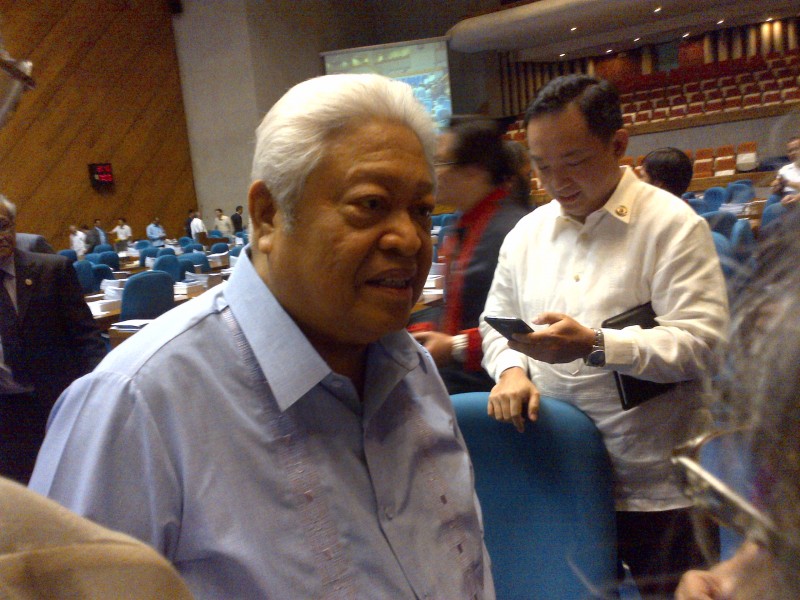While President Rodrigo Duterte was right in saying that the party-list sytem has been abused by the rich and powerful, several lawmakers said it should not be abolished, as it had given the marginalized a chance to be heard.
READ: Duterte wants to scrap party-list system
Instead, the lawmakers suggested stricter rules and guidelines for party-list representatives, as well as hefty fines and penalties for those who abuse the law.
The President on Friday said he wanted the party-list system stricken out of the new Constitution to be drafted by a constituent assembly (Con-ass).
‘Mockery of the law’
“With a new Constitution, I will insist: no party-list,” Mr. Duterte said, adding that the system has been abused, with the rich organizing their own groups and “making a mockery of the law.”
But in a statement, Albay Rep. Edcel Lagman, one of the principal authors of the party-list law, said party-list representation must be preserved, as it was “the intent of the Constitution to have the marginalized sectors represented in the House of Representatives.”
Lagman added: “What should be done is not to abolish the party-list system, but to jettison its proliferation as a tool of the economic-political elite, major political parties, and other groups and regional [aggroupments that] do not have any claim to marginalization.”
Trivialization
Instead of crucifying the party-list system, the Albay representative said the President should blame the Commission on Elections (Comelec) for allowing its “trivilization.”
Lagman said the Supreme Court was also to blame for its rulings on how party-list representation should be apportioned, which he said has veered away from the formula provided in the law.
“There are only about 15 of the 59 party-list seats that are filled by representatives of marginalized sectors,” Former Akbayan Rep. Walden Bello said.
But Bello said the solution was not to abolish the system but to make the rules on party-list representation more stringent, with bogus party-list groups fined at least P2 milllion and their representatives jailed for at least five years.
Progressive
The law should also be clear on who qualifies as genuine party-list representatives instead of this being left to the whims of Comelec commissioners, Bello said.
Kabayan Rep. Harry Roque said the party-list system had allowed individuals like him, a University of the Philippines professor, to get a seat in Congress, which would otherwise have gone to traditional politicians and political dynasties.
“The party-list system has facilitated the entry into Congress of the most progressive individuals, including two who are now part of President Duterte’s Cabinet.” Roque said, referring to Anti-Poverty Commissioner Liza Maza and Agrarian Reform Secretary Rafael Mariano. Maza was a Gabriela party-list representative, while Mariano represented Anakpawis.
Act Teachers Rep. Antonio Tinio also opposed doing away with the party-list representation in Congress, since the system “has enabled certain marginalized sectors, such as workers, peasants, women and youth to gain seats in Congress. Abolishing the party-list system would leave Congress totally in the hands of the traditional political elites,” he said.
“Let’s not throw the baby out with the bathwater,” Tinio added.
Spirit of the law
“Instead of scrapping the party-list system, why not go back to the spirit of the law that created it and ensure a stiffer accreditation of groups supposed to represent the country’s marginalized and underrepresented sectors?” said Bayan secretary general Renato Reyes.
“You don’t need to burn down the house to get rid of termites and other pests,” he added.
In a press forum in Quezon City on Saturday, Reyes said: “We just need to go back to the intention of the Constitution—[party-lists] are for the marginalized and underrepresented. You just can’t invent a sector and a representation. If needed, we should amend the law, making the criteria and accreditation of party-list groups stiffer,” he added.
Reyes also expressed opposition to the Duterte administration’s decision to convene Congress as a Con-ass instead of electing a constitutional convention (Con-con) that would pave the way for a shift to a federal-parliamentary form of government.
“It doesn’t follow that since it’s cheaper, it is better. It also doesn’t follow that because we can save a lot of money, we can be assured that powerful lawmakers will not betray us,” he said. TVJ
RELATED STORIES
Party-list bloc backs Alvarez, seeks juicy positions
New groups make it to party-list’s Top 10
RELATED VIDEO
